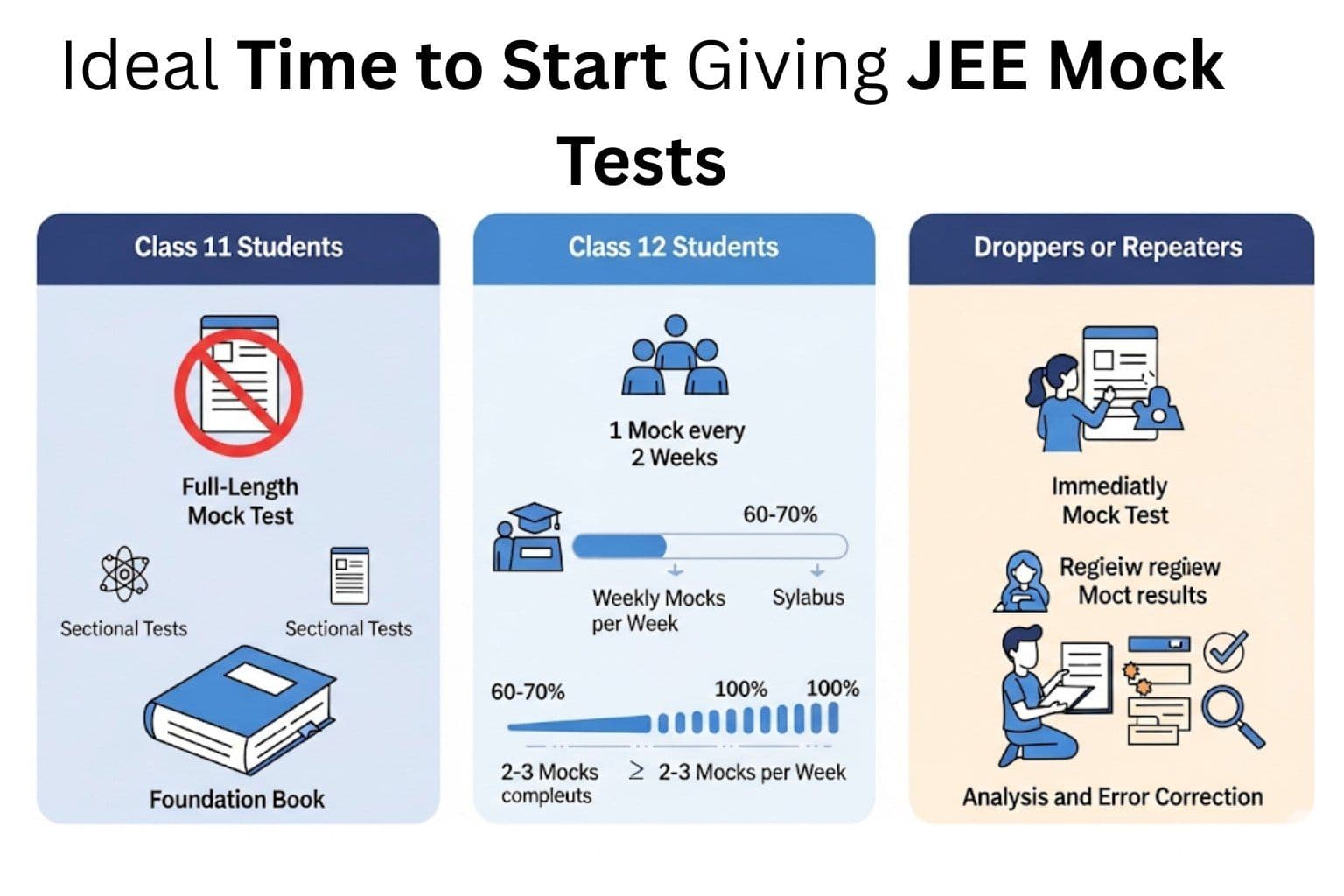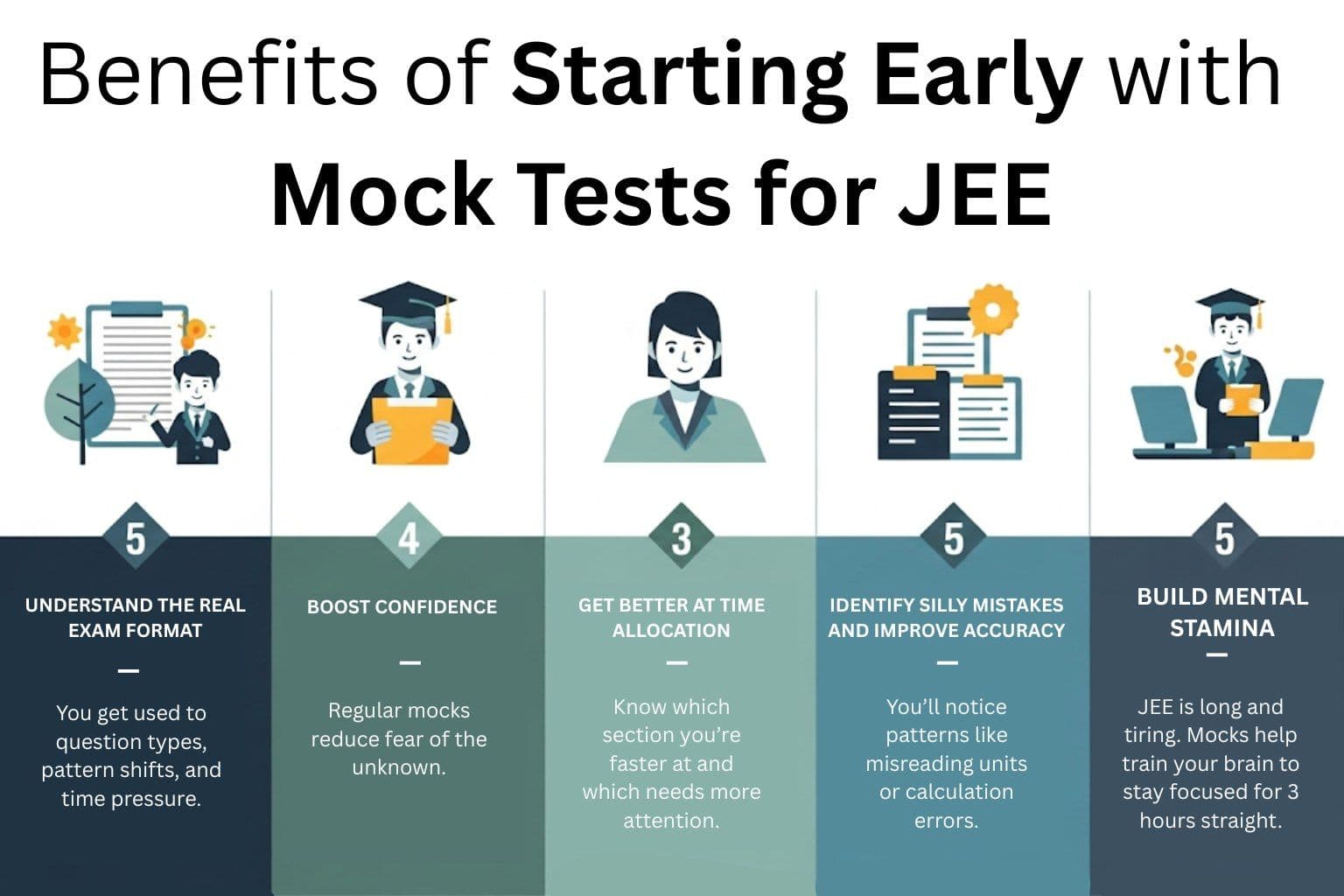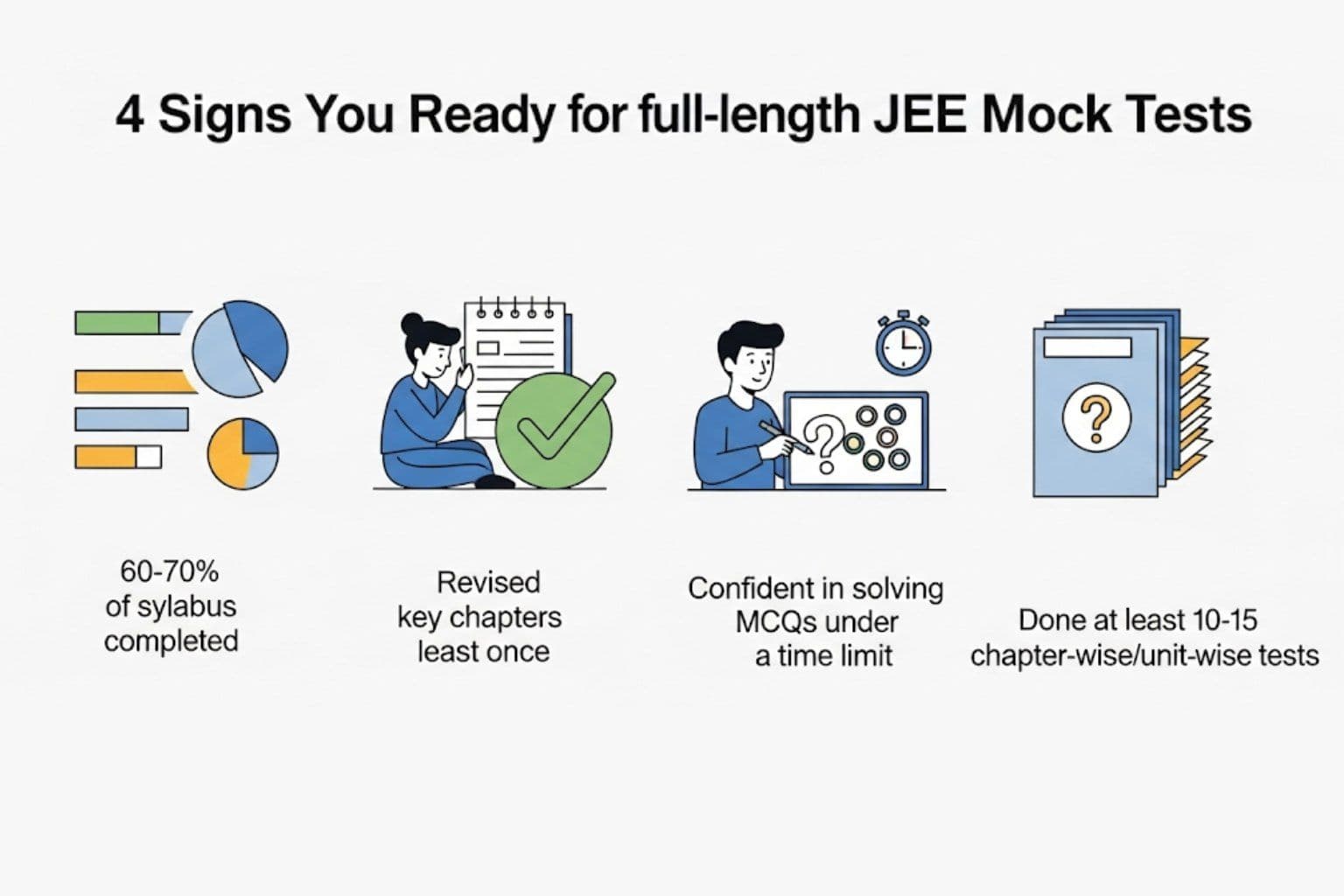Table of Contents
- Why Mock Tests Matter for JEE 2026
- Ideal Time to Start Giving JEE Mock Tests
- Benefits of Starting Early with Mock Tests
- How to Integrate Mock Tests Into Your JEE 2026 Preparation Strategy
- Signs You're Ready to Attempt Full-Length JEE Mock Tests
- Mistakes Students Make With JEE Mock Tests (and How to Avoid Them)
- How Many Mock Tests Should You Attempt Before JEE 2026?
- Best Time to Increase Mock Test Frequency: 3-Month Countdown Plan
- Analyzing Your Mock Test Results for Maximum Improvement in JEE
- Top Platforms for JEE Mock Tests (Free and Paid)
- FAQs About JEE 2026 Mock Test Strategy
- Conclusion: Make Mock Tests Your Strength in JEE 2026
When to Start Giving Mock Tests for JEE 2026?
Pratham Jiwnani
8/1/2025

Why Mock Tests Matter for JEE 2026
If you're preparing for JEE 2026, there's one thing you've probably heard on repeat: start giving mock tests early. But how early is too early? And what's the right way to use them so you're not just burning through questions without real progress?
Mock tests are more than just practice papers. They’re simulations of the actual exam, under timed conditions, with a proper mix of easy, moderate, and tough questions across Physics, Chemistry, and Math. They're your best tool to transition from studying theory to developing an exam mindset.
Also read: Top Online Platforms for JEE 2026 Preparation
Ideal Time to Start Giving JEE Mock Tests

For Class 11 Students
If you're in Class 11, your priority should be building a strong foundation in each subject. However, after completing each chapter or topic, taking short sectional or chapter-wise mock tests helps reinforce your understanding. This builds question-solving ability early and increases your confidence in tackling MCQs.
When to start full-length mocks? It’s too early in Class 11 unless you've already covered Class 12 topics. Use this time to become familiar with the format of objective questions, rather than full 3-hour mocks.
For Class 12 Students
This is where full-length mocks become necessary. As soon as about 60–70% of your syllabus is complete, ideally between August and October, start giving one mock every two weeks. The goal isn’t just to solve questions, it’s to test your endurance, timing, and accuracy.
How to increase frequency?
- 1 mock test every 2 weeks during syllabus completion
- 1 mock every week after syllabus completion (Nov–Jan)
- 2–3 mocks per week in revision phase (Feb–April)
For Droppers or Repeaters
If you're dropping a year, you already know the syllabus. You should begin full-length mocks early in your prep, ideally from the first month. If not full mocks, at least give weekly subject-wise tests and increase the frequency once your revision pace picks up.
Don’t just focus on scores; prioritize test analysis and error correction.
Benefits of Starting Early with Mock Tests

- Understand the real exam format: You get used to question types, pattern shifts, and time pressure.
- Boost confidence: Regular mocks reduce fear of the unknown.
- Get better at time allocation: Know which section you’re faster at and which needs more attention.
- Identify silly mistakes and improve accuracy: You’ll notice patterns like misreading units or calculation errors.
- Build mental stamina: JEE is long and tiring. Mocks help train your brain to stay focused for 3 hours straight.
How to Integrate Mock Tests Into Your JEE 2026 Preparation Strategy
Weekly vs. Monthly Mock Tests
- Class 11: 1 topic/chapter mock every 10 days
- Class 12 (syllabus incomplete): 1 full mock every 2 weeks
- Class 12 (syllabus done): 1–2 full mocks every week
- Last 2 months: 3 mocks per week with full analysis
Make Mock Tests Work For You
Use mock tests as checkpoints. Each mock should help you identify what needs improvement, whether it's a weak topic, mismanagement of time, or a lack of focus in the last 30 minutes of the exam. After each test, take a day to:
- Review all incorrect questions
- Re-attempt them without pressure
- Write down why you made that mistake
- Adjust your revision plan accordingly
Signs You're Ready to Attempt Full-Length JEE Mock Tests

You don't need the entire syllabus done to attempt your first mock. You're ready if:
- You’ve completed 60–70% of the syllabus
- You’ve revised key chapters at least once
- You're confident in solving MCQs under a time limit
- You've done at least 10–15 chapter-wise/unit-wise tests
Mistakes Students Make With JEE Mock Tests (and How to Avoid Them)
- Treating mocks casually: Always sit for a mock in one sitting, with a timer, in exam-like conditions.
- Skipping review: Without analysis, you're just solving questions, not improving.
- Mock test addiction: Some students give too many mocks and ignore revision. Don't fall into that trap.
- Score comparison syndrome: Everyone improves at a different pace. Focus on your graph, not someone else's.
How Many Mock Tests Should You Attempt Before JEE 2026?
Try to attempt around 30–40 full-length mocks before the final exam. That’s approximately:
- 10–15 tests between August and December
- 10–12 tests between January and March
- 10–15 tests in April (with gaps for revision)
What matters more than the number is how much you learn from each mock. Don’t cram tests just to say you’ve done 50.
Best Time to Increase Mock Test Frequency: 3-Month Countdown Plan
Mock Test Frequency Strategy (Month-by-Month)
| Month | Syllabus Status | Full-Length Mock Frequency |
|---|---|---|
| Aug–Sept | 60–70% done | 1 per week |
| Oct–Nov | 80–90% done | 2 per week |
| Dec | Nearly done | 3 per week |
| Jan (JEE Main 1st) | Complete | 4 per week |
| Feb–March | Post-JEE Main Revision | 2–3 per week |
| April (2nd Attempt) | Final push | 1 mock every alternate day |
Use Crackit’s Rank Predictor after each mock to understand your standing and refine your approach.
Signs You’re Ready for Full Mocks
You don’t need 100% syllabus completion. You’re ready if:
- You’ve covered 60–70% of the chapters.
- You’re comfortable with MCQs.
- You’ve done 10–15 chapter-wise/unit tests.
- You’re confident in handling a full 3-hour paper.
Common Mistakes to Avoid
- Skipping reviews: Giving mocks without analysis is just guesswork.
- Doing too many, too soon: Don’t burn out by overtesting early.
- Score obsession: Focus on growth, not comparison.
- Ignoring weak topics: If a mock reveals a gap, fix it fast.
Analyzing Your Mock Test Results for Maximum Improvement in JEE

Don't just look at scores, dig into the data:
- Time spent per section: Are you rushing Physics and stuck in Math?
- Negative marking sources: Are silly mistakes costing more than conceptual gaps?
- Accuracy rate: Aim for 80%+ in subjects you're strong at
- Types of questions missed: Are you losing marks in numericals, match the column, or comprehension-based?
Adjust Your Study Plan
Your mock tests should dictate your upcoming week. For example:
- Got 5/10 questions wrong in Organic Chemistry? Revise that section.
- Always lose time in Maths? Do timed drills daily.
- Getting tired in the last hour? Train your brain to stay sharp with morning mocks.
Top Platforms for JEE Mock Tests (Free and Paid)
- NTA Abhyas App – Free official mocks by NTA
- Allen Test Series – Good variety of papers at JEE Main and Advanced levels
- FIITJEE AITS – Closely replicates the real exam toughness and pattern
- Embibe – Offers AI-powered feedback and test adaptation
- Physics Wallah, Unacademy, Vedantu – Budget-friendly options with community support
FAQs About JEE 2026 Mock Test Strategy
Q. Should I give mock tests even if my syllabus isn’t complete?
Yes. Start with subject-wise or chapter-wise mocks. Full-length mocks can wait until 60–70% syllabus is done.
Q. My scores are low. Should I stop giving mocks?
Not. Low scores are part of the process. Use them to learn, not to feel discouraged.
Q. Is it okay to skip analysis sometimes?
Only if you’re reviewing it later. Ideally, block 2–3 hours post-test for proper analysis.
Q. How can I improve my mock test score over time?
Identify 3–4 consistent mistakes after every mock. Work on those areas specifically in the coming week.
Q. Should I revise before taking a mock test?
A quick 1-hour subject-wise recap helps. But avoid heavy study just before; treat mocks like the real exam.
Q. Which is better: online or offline mock tests?
If you're giving JEE online (which most will), take mocks in the same mode. Practicing offline is helpful only early in prep.
Conclusion: Make Mock Tests Your Strength in JEE 2026
Mock tests aren’t just a checkbox; they're a mirror. They show you where you stand, where you falter, and where you shine. If used smartly, they can be your most powerful preparation tool.
Start when it makes sense, not when others tell you to. Set a goal for each mock test. And remember, even low scores are progress if you're learning from them.
Start now with the NTA’s Abhyas app, and make every mock test count.
Also check: How to Crack JEE Main in 6 Months and use our JEE Rank & College Predictor to track where you stand.
Categories
Join the Discussion
0 comments